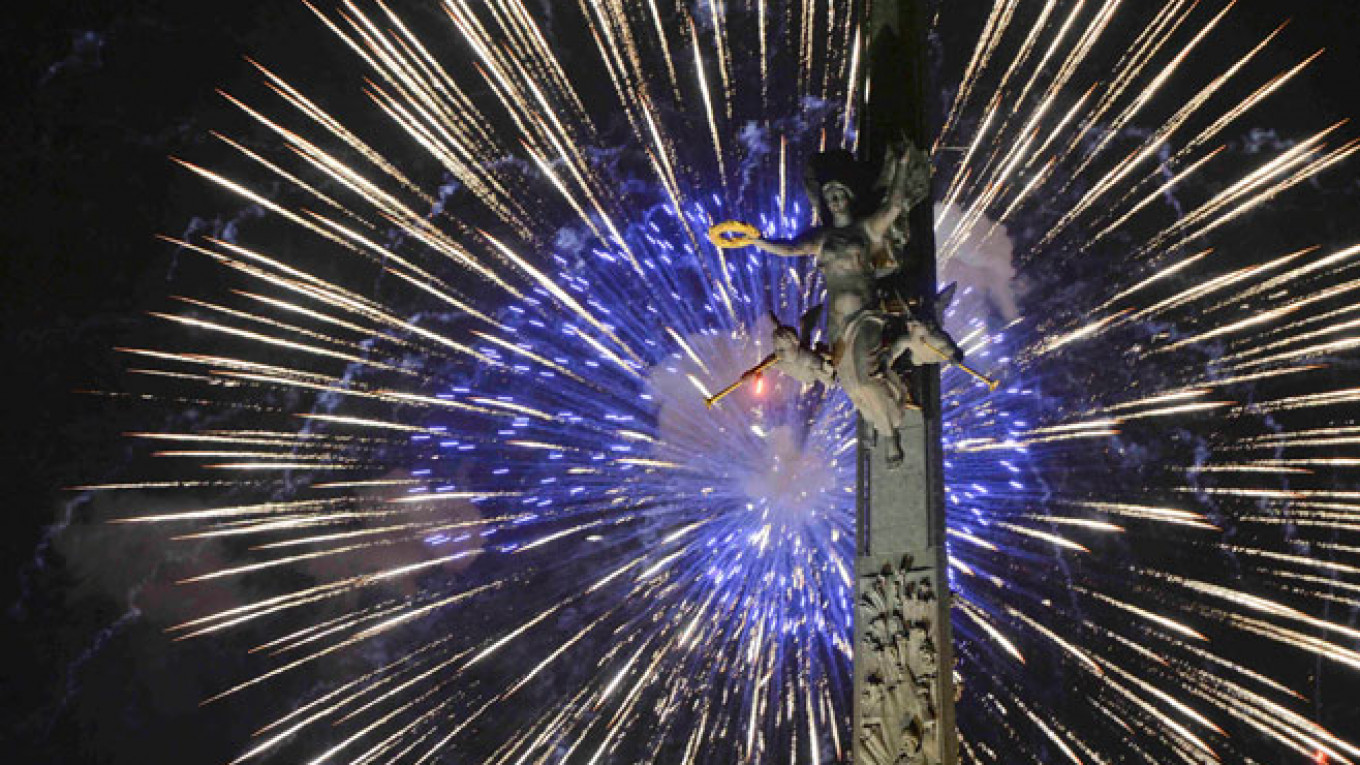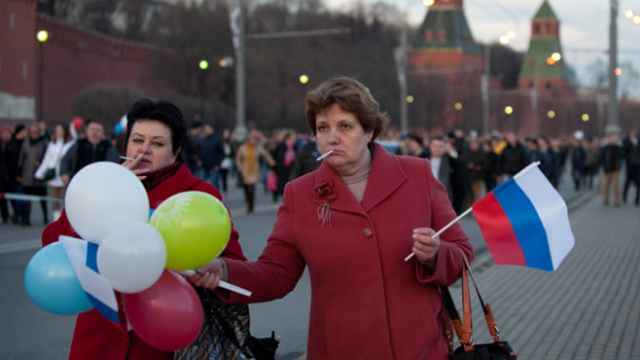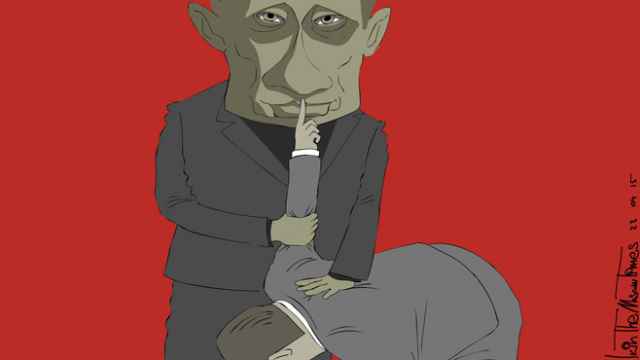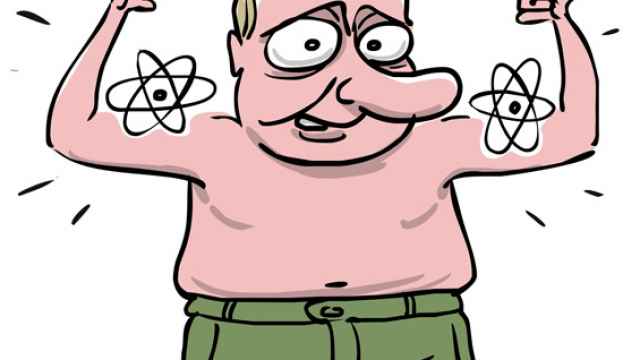During the 70 years since the great victory over Nazi Germany, the interpretation of that event by first Soviet, and later Russian, authorities has repeatedly changed. Further, Russian society's memories of that war have undergone a significant transformation over the course of successive generations.
Today, Russian authorities emphasize the victory in that war and the greatness of the country, as well as the geopolitical trophies that the Soviet Union acquired under former Soviet leader Josef Stalin.
It proclaims the right of modern Russia to continue possession of some of those trophies, even with the use of arms.
At the same time, as the memory of the soldiers from the front lines and the entire wartime generation slips ever farther into the past, Russian society is clearly losing its immunity to provoking a new major war as the revanchist and militaristic mood steadily intensifies.
Motorists now proudly display window decals reading: "We could do it in 1941-45 and we can do it now," or else "Yesterday Crimea, tomorrow Rome."
The pompous parade on Red Square featuring the latest military equipment, speeches suggesting that Victory Day is a "holy day," the deliberate refusal to speak about the criminal actions of former Soviet leader Josef Stalin — all of this only inflates the revanchism and militarism in Russian society and serves to justify today's authoritarianism and a new arms race.
The great song "Victory Day" that David Tukhmanov wrote in 1975 spoke of commemorating "the holiday with tears in my eyes." It was that line that made it the public's favorite hymn for remembering the war.
That was the only way the people and the authorities could view this holiday — with bitterness over the enormous suffering, the loved ones lost in every family. This was what defined the mood on May 9.
Stalin disliked May 9 and even canceled it as a public holiday. In fact, the memory of the war was largely taboo to him. Stalin understood that the tens of millions of those who survived the front lines, and those who labored at the rear, knew the truth about the war.
They knew about the repression that had gutted the Army Command Corps on the eve of the war, the disaster of 1941-42 when the Soviet Union lost the European part of the country during the Nazi invasion.
They knew about the strange pact with Hitler in 1939-41, the mistakes committed by political and military leaders that cost millions of lives, mass starvation, the collapse of Soviet agriculture resulting from forced collectivization and the flowering civilization Soviet soldiers had glimpsed in what they had been told was a "decaying" Europe.
Stalin deliberately underestimated the toll of human lives at 7 million and ordered disabled war veterans sent to sanatoriums deep in the woods, away from the eyes of the public.
The colossal losses, the millions of people left with disabilities — it all reminded him of his personal responsibility for the enormity of the human tragedy.
Even while Stalin was still in power, veterans began holding spontaneous gatherings on Victory Day.
Those who had fought at the front met every year near the Bolshoi Theater and held up signs indicating in which military units they had served.
They smoked, recalled events, wept and drank to the memory of fallen comrades, respectfully refraining from clinking their glasses as custom demands when remembering the dead. For the first 20 years after 1945, this was practically the only public remembrance of the war throughout the entire Soviet Union.
Three of my family members died on the front, leaving their wives and other relatives to care for 12 hungry children, so for us Victory Day has always been a time of remembrance and mourning.
The Soviet Union first began celebrating Victory Day as a public holiday and a day off from work on May 9, 1965, shortly after former Soviet leader Leonid Brezhnev came to power.
It was also the occasion of the first military parade. Making the memory of the war and the victory sacred provided an important new source of legitimacy for the Communist Party and for Brezhnev personally.
Also, millions of those who had fought at the front lines or labored at the rear were still alive, and the memory of the war and the victory were primarily marked by sorrow and silence.
I remember from my childhood in the 1970s that the main idea was that such a war should never happen again.
That was what characterized the policy of detente in the early 1970s — that and the determination of the Soviet Union to never engage in saber-rattling with its nuclear weapons.
Moscow officially proclaimed itself the main champion of world peace. Banners, posters and countless emblems bearing the slogan "Peace to the world!" hung throughout the country.
That was the imperative requirement of a people that had lived through a terrible war.
Brezhnev also gave a more realistic figure for the number of Soviet military and civilian war dead — 20 million.
Later, former Soviet leader Mikhail Gorbachev announced the figure of 27 million — four times more than Stalin had admitted.
Today, when almost every member of the wartime generation — those who fought and those who witnessed the horrors of the war — has passed away, there are many young Russians who most often imagine war as some sort of adventure, as some sort of computer game. They fall under the inebriating influence of fictional films celebrating the "romance" of war.
Everywhere they see golden and glorious signs of triumph, greatness, empire, evidence of Stalin's "genius," parades, military might, power, domination and war.
Yes, war. For the first time since 1945, Russia is rapidly losing what was once its almost unshakable immunity to war. It is losing its immunity to national catastrophe.
Vladimir Ryzhkov, a State Duma deputy from 1993 to 2007, is a political analyst.
A Message from The Moscow Times:
Dear readers,
We are facing unprecedented challenges. Russia's Prosecutor General's Office has designated The Moscow Times as an "undesirable" organization, criminalizing our work and putting our staff at risk of prosecution. This follows our earlier unjust labeling as a "foreign agent."
These actions are direct attempts to silence independent journalism in Russia. The authorities claim our work "discredits the decisions of the Russian leadership." We see things differently: we strive to provide accurate, unbiased reporting on Russia.
We, the journalists of The Moscow Times, refuse to be silenced. But to continue our work, we need your help.
Your support, no matter how small, makes a world of difference. If you can, please support us monthly starting from just $2. It's quick to set up, and every contribution makes a significant impact.
By supporting The Moscow Times, you're defending open, independent journalism in the face of repression. Thank you for standing with us.
Remind me later.








